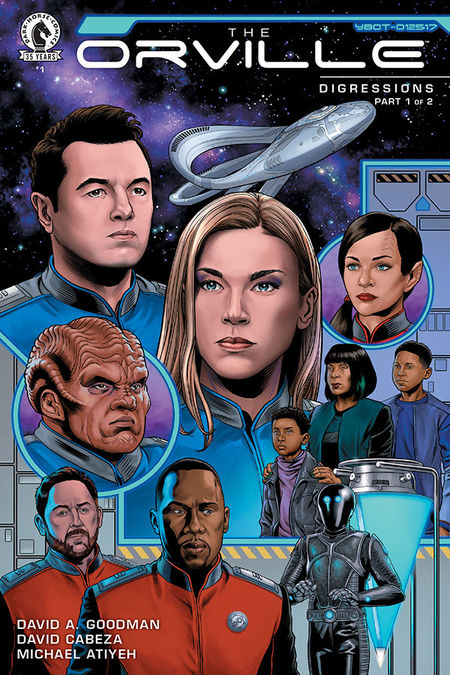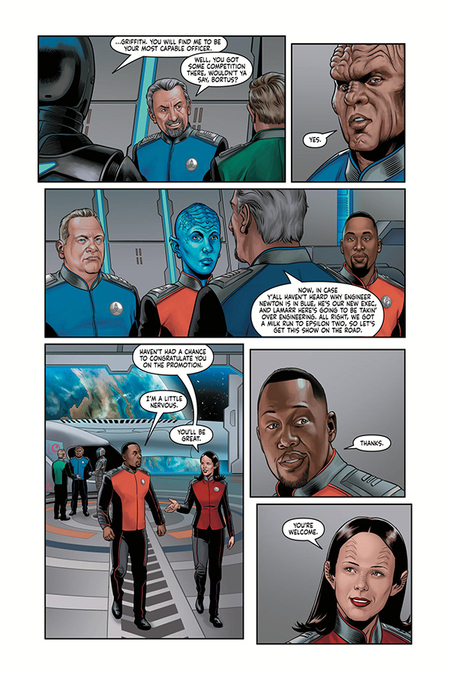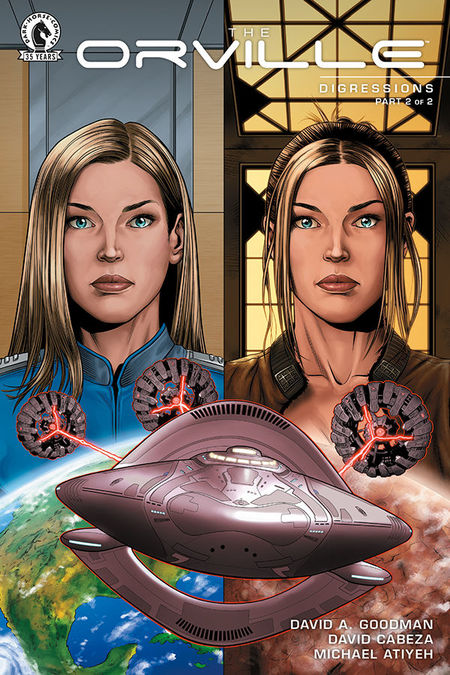You have to hand it to Seth MacFarlane!
When he launched The Orville in September 2017, it was styled as a wisecracking, affectionate Star Trek parody that, while possessed of the heart of a great sci-fi storyteller, nevertheless was happy to look askance at the galaxy and muse on its more absurd aspects.
Two seasons in, with a third delayed one on the way, the result as much of COVID delays as a new broadcasting home, the show has found itself telling some very clever, thoughtful, and yes, still judiciously funny stories, ones which understand that even the funniest of shows need a solid human heart at their centre to actually mean anything.
They also need some playing fast and lose with time and space which is what a two-part story from Dark Horse Comics, Digressions – script by David A. Goodman, art by David Cabeza and colours by Michael Atiyeh – has in pleasing abundance.
In this boundary hopping narrative where the future is the past and the present is the future from the past – just go with it; surprisingly, it all comes out pretty well in the wash despite a rush to the finish line to wrap things up – Commander Kelly Grayson (played by Adrianne Palicki) gets drawn to the future before sent back seven years in the past from whence she came, supposedly memory wiped but really remembering everything from her trip to the Orville.
The events of this lead-in to the graphic novel episode are detailed in the thirteenth and penultimate episode of the second season, with the two-part story neatly filling in the gaps between “Tomorrow, and Tomorrow, and Tomorrow” and “The Road Not Taken” (the first title references Shakespeare’s Macbeth while the second pays homage to the famous Robert Frost poem).
As you might expect from a story where people are being ripped out of and placed in timelines with merry abandon, things get really screwy in the present day, all precipitated by a shaken past Greyson’s decision, spurred by remembering a possible future and her quite different present all at once, to not go and have a second date with the Orville’s captain, Ed Mercer (Seth MacFarlane).
This sets in train a whole epic butterfly effect of changes in the Orville’s reality where all sorts of characters are present and accounted for but many of them not even close to where they are in the show we have come to know and love (well, audiences anyway; critics, for some reason, have fallen far less in love with The Orville).
Naturally only Greyson knows something is awry, or about to be awry (she has seen it play out) but as you might expect, when she finally starts to tell those around her that something bad is coming their way because she has seen it happen, everyone thinks she’s mad and a few Quarks short of a good space station bar.
It’s a classic Star Trek-ian device, reflecting, no doubt, MacFarlane’s and the graphic novel’s creators’ love of the franchise, and it works brilliantly well in the context of The Orville.
Greyson is your archetypal Cassandra, begging people to acknowledge the looming dangers of the near-future, even going so far as to tell what it looks like and how they should prepare, and she is, by and large, not listened to.
She encounters pretty much all the characters we know and love, some of whom are doing well in this timeline, some of whom are not – finding out who is who is one of the great pleasures of Digressions and is handled wit h the show’s customary mix of humour and gravitas – and finds herself in the invidious position of trying to stop the very worst of things happening.
Quite whether it does is, of course, best left to the reading, but safe to say that Digressions, both in its tight, careful writing (for the most part) and its evocative artwork which looks like the show sprung to life in vivacious 2D form, does an exemplary job of giving us the bridging episode we never got in season two of The Orville.
Not that we were poorer for not seeing what happened in Digressions necessarily, with the final two episodes of the season beautifully their own tight, well constructed and delivered story, but the graphic novel fills in the blanks so well that it feels like an organic part of a greater whole, which is even more impressive since Goodman was not, naturally, part of The Orville‘s writing team.
The only downside to this two-parter is the way it rushes to finish its story in the second half, itself a very Star Trek thing to do, but given it then dovetails into the already existing TV episode, very little harm is done.
Overall, Digressions is a solidly enjoyable addition to season two canon, enriching an already well-told tale, and giving us additional insight into the show’s characters and the overall direction of a third season which is coming up fast, 10 March 2022 to be precise, and which looks to further cement the reputation of The Orville as a fine, fresh and comedically inspired addition to the sci-fi genre.


